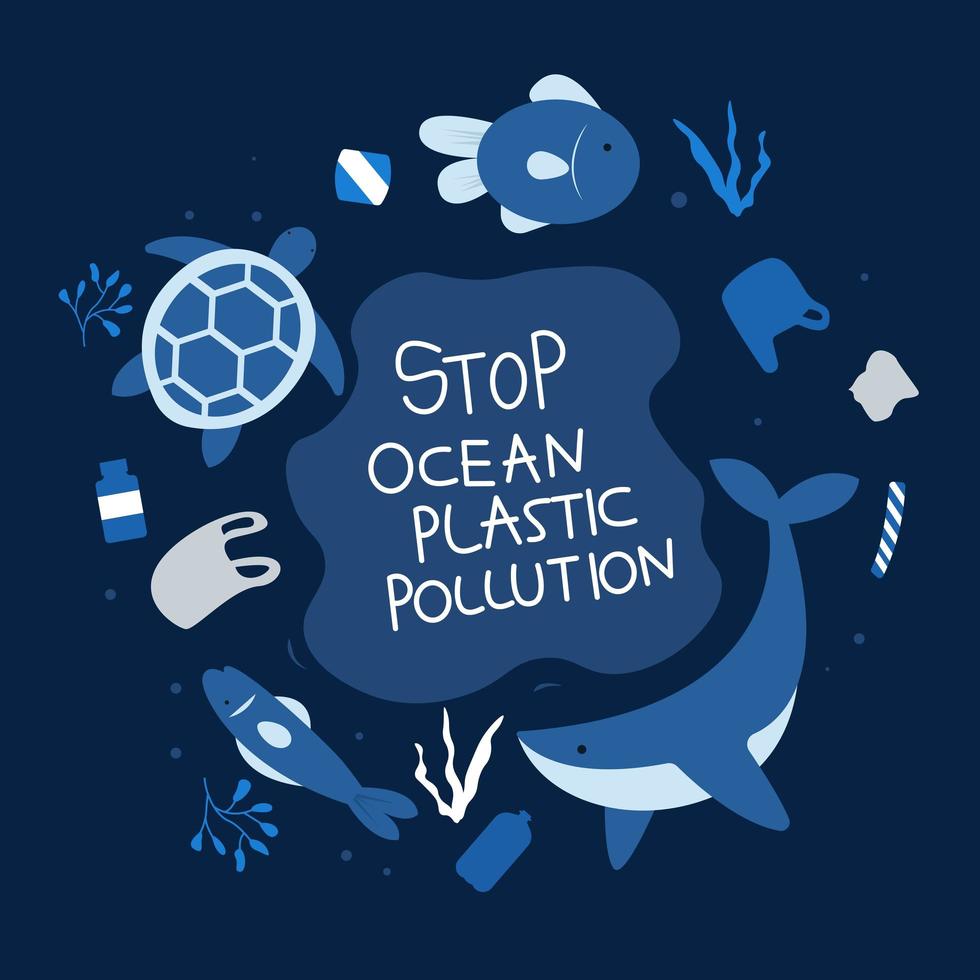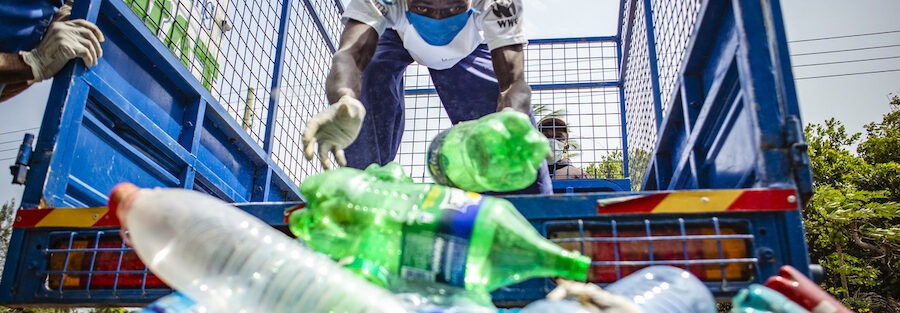Combating Plastic Pollution: A Call for Global Action and Sustainable Solutions
Yasir Jamal and Israel Olaniyan Tweet
In our ever-increasingly polluted world, the insidious release of tons of pollutants into the air jeopardizes our environment daily. Although boasting numerous benefits, plastics – one of these pollutants – assumes a menacing presence, taking the form of macro debris, mega debris, and micro debris [1]. Despite international, national, and local policy responses and industry commitments to curb this menace, its uncontrolled accumulation and devastating impact on our ecosystem have thrust it into the limelight as an urgent concern [2]. As part of the commemoration of World Environment Day, celebrated on June 5th each year, this article delves into the complexities of plastic pollution, examining its causes and effects. Furthermore, it presents practical solutions to effectively combat the pressing issue of plastic pollution.
Plastic pollution has quadrupled in the last three decades, reaching 460 million tonnes in global production. Millions of tonnes of plastic waste leak into aquatic environments and oceans each year, leading to long-lasting consequences [3]. Recent data from a study conducted by The Plastic Collective paints a grim picture of the plastic pollution crisis, revealing that of the 460 million tons of plastic that are produced each year, a shocking 14 million tons find their way into our oceans constituting 80% of surface litter [4]. This deluge of plastic exacerbated by its non-biodegradable nature, poses an imminent threat to our delicate ecosystems [2].
According to the Global Plastic Outlook report from a comprehensive study conducted by the Organization for Economic Cooperation and Development (OECD), it has been revealed that OECD countries are responsible for 14% of the world’s total plastic leakage of which over 45% are both microplastic and macroplastic leakages, reflecting the huge role that these nations play in plastic pollution. Although the COVID-19 crisis led to a 2.2% decrease in plastics use in 2020 due to slowed economic activity, the world has since experienced a rise in littering from food takeaway packaging, and medical plastic waste such as face masks. With the resumption of economic activity, plastic pollution has also rebounded [3].

Vivid visuals that unveil the harrowing reality of plastic pollution have continued to appear revealing marine life entangled in plastic debris, evoking a poignant understanding of the devastating impact on ecosystems. According to the OECD report, the world is producing twice as much plastic waste as two decades ago, with the bulk of it ending up in landfill, incinerated or leaking into the environment, and only 9% successfully recycled [3]. This alarming increase in plastic pollution not only poses dire consequences for our planet but also reminds us of the urgency with which we need to act against plastic pollution.
To comprehend the full scope of the plastic pollution crisis, it is essential to delve into its multifaceted causes. In addition to the improper disposal of single-use plastics, which include ubiquitous items like water bottles, bags, straws, and food containers, corporate practices and governmental policies also perpetuate this crisis [1]. The insidious practice of incineration, responsible for the release of a staggering 850 million tons of greenhouse gases each year, doubles the emission levels while exacerbating the detrimental impact on the environment. Additionally, synthetic fishing nets, widely used in the fishing industry, pose a significant threat to marine life as they leach toxins and disintegrate into smaller fragments, ensnaring and endangering birds, turtles, whales, and dolphins, disrupting the natural lifecycle, food chains, and overall ecosystem, and leading to a detrimental impact on aquatic animals. [5].
Leading scientists, ecologists, environmentalists, and policymakers have continued to shed light on the gravity of the plastic pollution crisis, all agreeing that plastic pollution disrupts the delicate balance of marine ecosystems and threatens the very survival of numerous species, jeopardizing our planet’s biodiversity. In the South Pacific, remote islands are marred by the accumulation of plastic waste, while in Southeast Asia, rivers are choked with debris, revealing the global nature of the problem. The plastic pollution crisis transcends borders, necessitating international collaboration.
Reducing plastic pollution, therefore, requires decisive action and international cooperation. It demands a multi-faceted approach that encompasses reducing plastic production through innovation, improving product design, and promoting environmentally friendly alternatives. However, these efforts must be coupled with enhanced waste management and increased recycling. Chelsea Rochman, a professor in the Department of Ecology & Evolutionary Biology at the University of Toronto (U of T) recommends that “the global community must coordinate a fundamental transformation of the plastics economy, one that reduces the amount of virgin plastic production, and reimagines how we make use and dispose of plastic materials [6].”

International efforts, such as the United Nations’ Clean Seas campaign and collaborations between governments, NGOs, and corporations, strive to tackle plastic pollution on a global scale [7]. International agreements, such as the Basel Convention, also provide an avenue to regulate the transboundary movement of plastic waste, ensuring responsible disposal and recycling practices globally. Implementing extended producer responsibility programs, which hold manufacturers accountable for the entire lifecycle of their products, can incentivize eco-friendly design and reduce plastic waste. Comprehensive policy measures such as banning single-use plastics, imposing levies, or fines, and investing in recycling infrastructure which has shown promise in several regions can also be introduced as discussed below:
- Reduce single-use plastics: By decreasing the use of single-use plastics like straws, bags, and utensils, we can significantly reduce plastic waste. Embrace reusable alternatives such as bags, utensils, and water bottles to minimize reliance on disposable plastics.
- Recycle: Recycling plastic products plays a crucial role in reducing plastic pollution. By recycling plastic waste, we can repurpose it into new products, effectively decreasing the volume of plastic waste in the environment. Governments and businesses should invest in improved recycling infrastructure to enhance the effectiveness of plastic recycling.
- Support bans on single-use plastics: Many regions have implemented bans on single-use plastics, such as straws and bags, to combat plastic pollution. Supporting these bans and advocating for further policies can contribute to reducing plastic waste. Additionally, implementing taxes and fines on plastic products can incentivize consumers and businesses to adopt more sustainable alternatives [8].
- Clean up plastic waste: Participating in beach cleanups and other initiatives focused on removing plastic waste from oceans and water bodies is crucial. These efforts help mitigate the immediate impacts of plastic pollution and raise awareness about the issue.
- Educate and raise awareness: Spreading knowledge about the negative effects of plastic pollution and promoting the importance of reducing plastic use is key to driving change. Educate yourself and others about the issue, encouraging conscious consumer choices and responsible waste management practices.
- Innovative solutions: Invest in research and development of new technologies that can effectively recycle plastic waste or provide sustainable alternatives to plastic products [9]. Encouraging innovation in this field can lead to breakthroughs in tackling plastic pollution.
With the commemoration of this year’s world environmental day, we are reminded that each one of us holds the power to make a difference in the fight against plastic pollution. By reducing our consumption of single-use plastics, embracing reusable alternatives, supporting bans on single-use plastics, participating in clean-up efforts, and raising awareness within our communities, we can collectively safeguard our planet. Governments, businesses, and individuals must unite to invest in innovative research and development, striving for breakthrough technologies that revolutionize plastic recycling and offer sustainable alternatives.
The plastic pollution crisis demands immediate attention and robust action. Armed with the knowledge of its causes, effects, and potential solutions, we have a responsibility to alter our habits and advocate for change. By adopting sustainable practices, supporting legislative measures, and fostering international collaboration, we can steer the course toward a cleaner, healthier future. Let us rise to the challenge and protect our planet from the grip of plastic pollution. The time to act is now.
REFERENCES
1. Obebe, S. B., & Adamu, A. A. (2020). Plastic pollution: causes, effects and preventions. Int J Eng Appl Sci Technol, 4(12), 85-95.
2. How to reduce plastic waste | 20 tips to save the planet. By FutureLearn (2021). Retrieved from: https://www.futurelearn.com/info/blog/how-to-reduce-plastic-waste.
3. OECD Global Plastics Outlook (2022). Rerrieved from https://www.oecd.org/environment/plastic-pollution-is-growing-relentlessly-as-waste-management-and-recycling-fall-short.htm
4. Plastic Waste Free Islands. Blueprint – a journey to zero plastic waste. (2021). Retrieved from: https://www.iucn.org/resources/issues-brief/marine-plastic-pollution#:~:text=At%20least%2014%20million%20tons,causes%20severe%20injuries%20and%20death.
5. The Plastic Waste Problem and its Solutions. By Plastic Pollution Blogger. (2023). Retrieved from: https://www.plasticcollective.co/the-plastic-waste-problem-and-its-solutions/
6. Science Daily. Ecologists Sound Alarm on Plastic Pollution. (2020). Retrieved from https://www.sciencedaily.com/releases/2020/09/200917181303.htm
7. UNEP Clean Seas Campaign (2021). Retrieved from https://www.unep.org/news-and-stories/story/clean-seas-campaign-promotes-right-healthy-environment-including-plastic
8. Causes, Effects and Incredible Solutions to Plastic Pollution You’ll Wish You’d Known. By Conserve Energy Future. Retrieved from: https://www.conserve-energy-future.com/causes-effects-solutions-of-plastic-pollution.php
9. Jorgensen, B., Krasny, M., & Baztan, J. (2021). Volunteer beach cleanups: civic environmental stewardship combating global plastic pollution. Sustainability Science, 16, 153-167.




